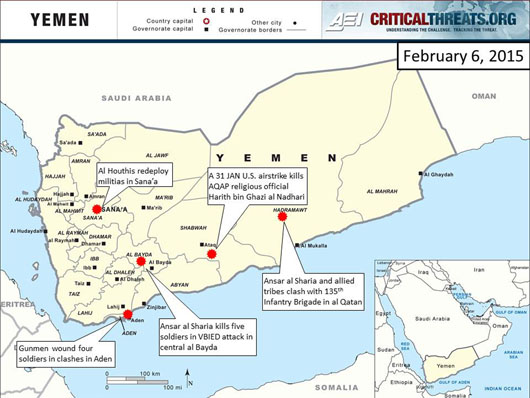Weeks of negotiations to resolve Yemen’s political crisis end with the al Houthis, whose actions led to the resignation of the Yemeni executive branch, announcing the formation of an interim governing body. The al Houthis’ Revolutionary Committee will oversee the new body and has dissolved Yemen’s parliament. Few outside of the signatories to the al Houthi deal are likely to accept the new central government.
The al Houthis solidified their control over the Yemeni government with the formation of an interim governing body overseen by al Houthi leadership. The al Houthis announced on February 6 that the al Houthis’ Revolutionary Committee, led by Mohammed Ali Abdul Karim al Houthi, will oversee the political transition process and heralded the steps as a continuation of the 2011 revolution. The al Houthis dissolved Yemen’s parliament and formed an interim 551- member assembly that will elect a five-member presidential council. They set a two-year transitional period during which the new national assembly will draft the new constitution. Al Houthi militias redeployed throughout the capital ahead of the announcement. Yemen’s other political factions have yet to respond to the announcement, but the Southern Movement has reportedly announced it will not cooperate with the al Houthis.
Al Houthi militias continue to crack down on anti-al Houthi protesters and journalists critical of the movement. Al Houthi local militias, known as popular committees, stormed the headquarters of local newspaper Akhbar al Yom in Sana’a on February 5 and detained the newspaper’s journalists and editors. Al Houthi gunmen also attacked protesters in al Hudaydah.
Ansar al Sharia attacks persist in southern and eastern Yemen. Al Qaeda in the Arabian Peninsula’s (AQAP) insurgent arm, Ansar al Sharia, and allied tribesmen attacked the 135th Infantry Brigade in al Qatan and Sayun, Hadramawt on February 3. Suspected Ansar al Sharia militants detonated a vehicle-borne improvised explosive device on February 4 in al Sawadiyah, central al Bayda. Five soldiers died in the attack.
AQAP eulogized a senior religious official killed in a January 31 U.S. airstrike. AQAP confirmed in a February 5 statement that Harith bin Ghazi al Nadhari, also known as Mohammed Murshedi, died from wounds sustained during a January 31 U.S. airstrike in Shabwah governorate. Nadhari was a key spokesman for the group, and his death is unlikely to affect AQAP operations.
Yemen is facing an impending financial collapse as the government runs out of cash. It is becoming increasingly likely the government will be unable to pay civil and military salaries in the coming two months. Public sector media employees protested on February 3 outside the Central Bank of Yemen in Sana’a after the bank refused to release employee’s salaries. Some employees have reportedly not received salaries for over two months. Union leaders stated that protests will escalate if salaries are not paid. Saudi Arabia, which has historically bankrolled the Yemeni state, has not given aid to Yemen since the fall.
The announcement of an al Houthi-backed national council may elicit strong reactions from regional factions, especially pro-secession Southern Movement factions. AQAP will likely try to exploit unrest created by groups that reject the new political agreement.
← PREVIOUS |
NEXT → |

